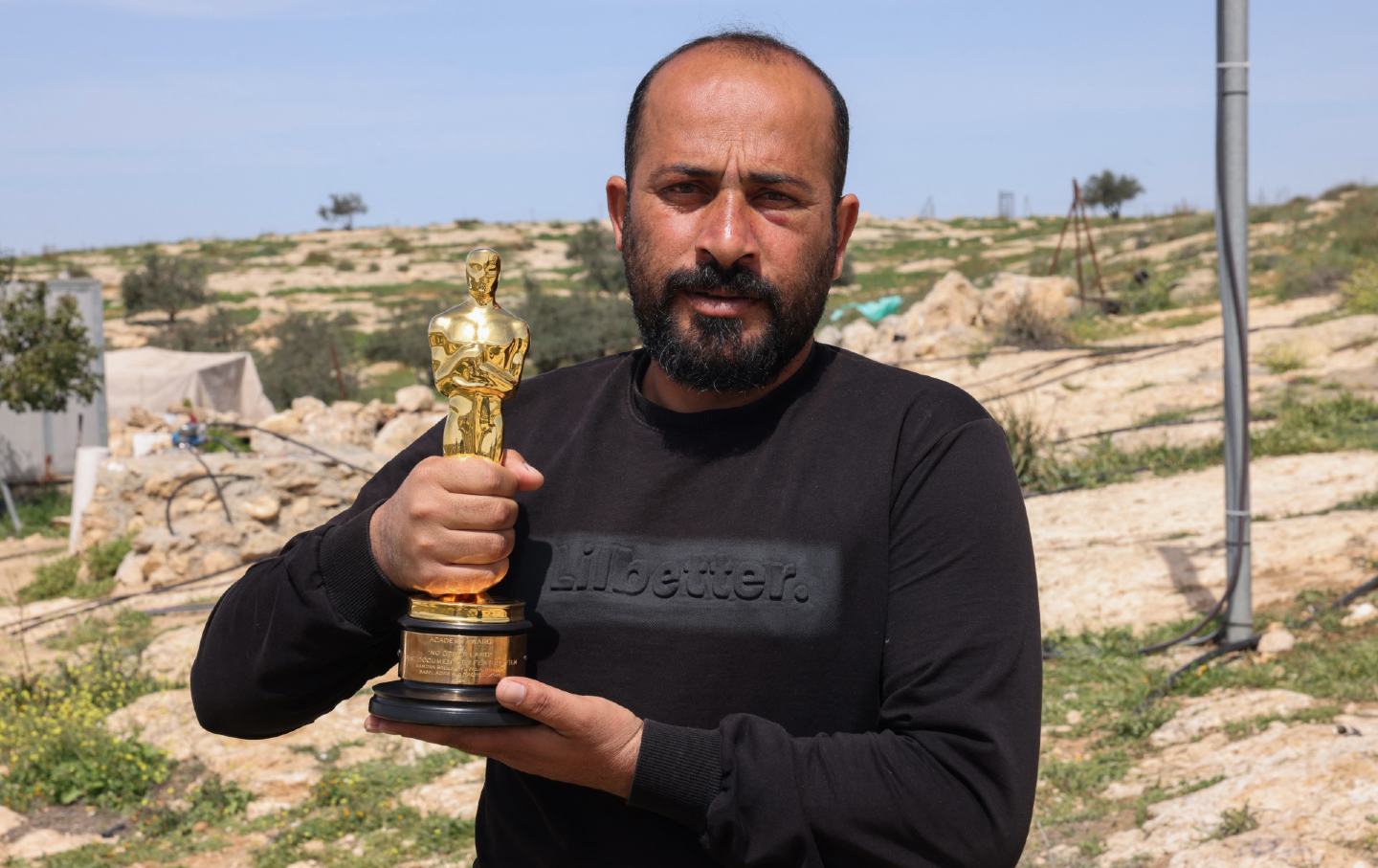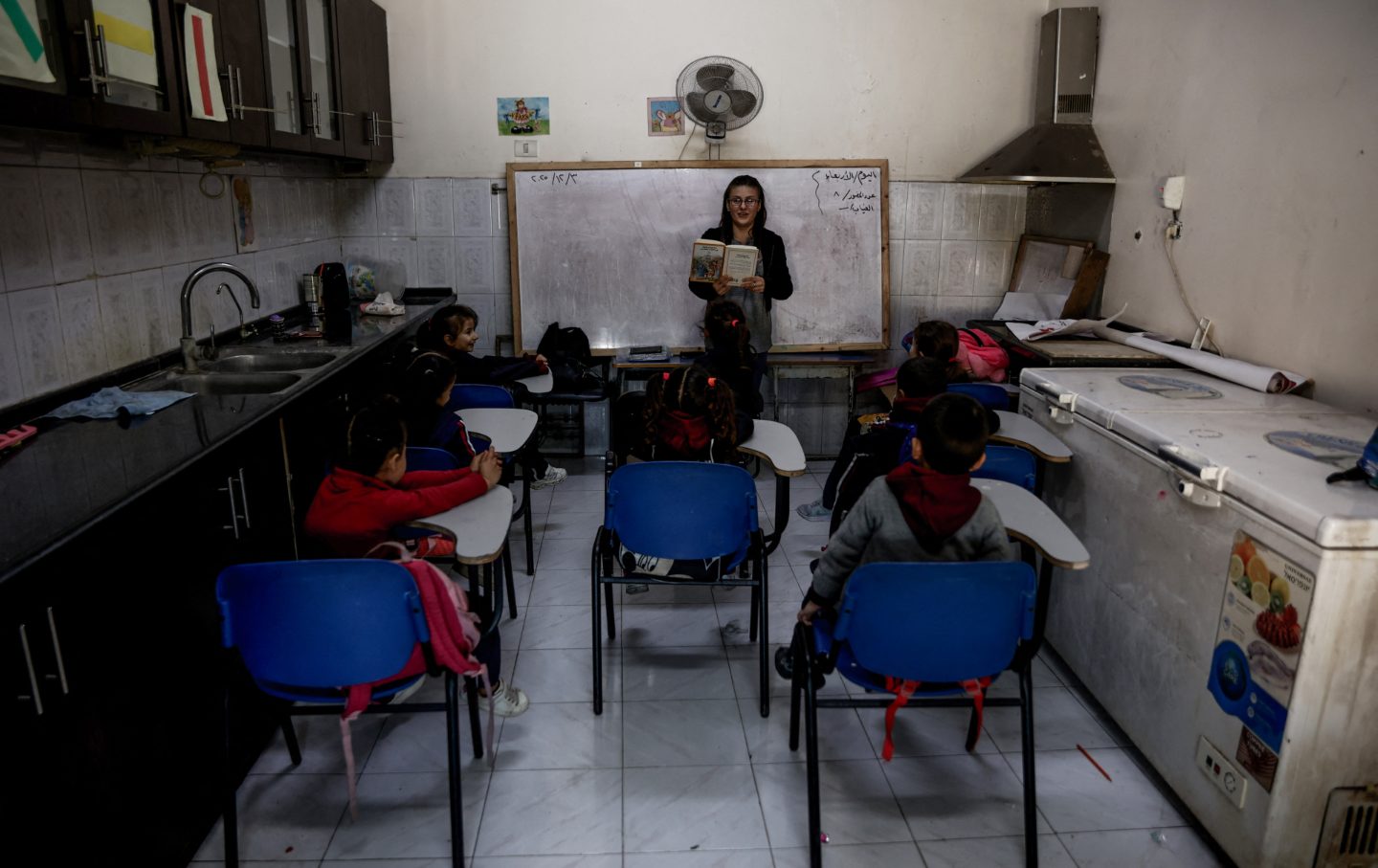Must a Palestinian Win an Oscar for the World to Care When He’s Attacked?
The assault and arrest of Ballal Hamdan is horrendous, but the framing of the incident reproduces the idea that some lives are more worthy of defense than others.

Palestinian filmmaker and Oscar winner for the documentary No Other Land Hamdan Ballal poses for a picture with his Oscar, as he recovers after Israeli settlers attacked him at home, in his village of Susya in the south of the occupied West Bank on March 26, 2025.
(Hazem Bader/AFP via Getty Images)
Last night, armed Israeli settlers descended upon the Palestinian village of Susiya in the Masafer Yatta region of the occupied West Bank and assaulted Hamdan Ballal, a contributor to +972 and codirector of the film No Other Land, which recently won an Oscar for Best Documentary. Israeli soldiers were present at the scene and stood by as Ballal was attacked along with other residents and activists, only to then detain him and two other Palestinians overnight in a military base, where the three endured further abuse.
When news broke of the settler ambush, the headlines focused almost exclusively on one thing: Ballal’s Oscar win. Across mainstream Western media—from the Associated Press and Reuters, to The Washington Post and the BBC—publications used surprisingly direct language to describe the attack on this “Palestinian Oscar winner.”
Unlike some of their coverage of Israel’s genocidal war in Gaza, for instance, these outlets clearly named the perpetrators of the assault—Israeli settlers—with one traditionally liberal publication going so far as to describe his brutal arrest by the Israeli army as a “kidnapping.” But still, the emphasis was clear: The assault and detention of a Palestinian is notable because he has received international acclaim.
Of course, what happened to Ballal is not random. As codirector of a film that documents the ethnic cleansing of Palestinians and the violent expansion of Israeli settlements in the villages of Masafer Yatta, he has used his platform to speak directly and unapologetically about Israeli apartheid and dispossession. Targeting him is part of a broader strategy of silencing Palestinian cultural figures and truth-tellers, especially those who succeed in disrupting dominant narratives on global stages.
But the framing of his assault and arrest should alarm us. Why must a Palestinian’s intellectual recognition be the basis for solidarity? Why does the global media insist on highlighting that Ballal is an Oscar-winning filmmaker?
This kind of solidarity, grounded in fame or intellectual achievement, dangerously aligns with colonial patterns of recognition. It reproduces the logic that some lives—those legible to Western audiences—are more grievable, more shocking to violate, and more worthy of defense.
The underlying message is that if even an award-winning filmmaker isn’t immune to state violence, then something is truly wrong. But shouldn’t international media recognize something is wrong when Palestinians without global awards—students, farmers, mothers, teachers, activists—are arrested by Israeli forces every day? Their stories rarely make headlines. Their names are rarely known.
A decolonial solidarity
The colonial logic reinforced by these headlines—that sees Palestinians as valuable only when they produce something recognizable or useful to Western audiences—has deep roots.
Under colonial regimes, the “good native” was always the one who spoke the colonizer’s language, produced art for foreign consumption, or performed civility in the approved ways. In Mandate Palestine, British authorities often favored dealing with urban, Western-educated elites in the cosmopolitan cities of Jerusalem and Haifa, those who could navigate colonial institutions and posed little threat to imperial control. At the same time, they violently suppressed rural resistance during the 1936–39 revolt, targeting peasants and nationalist organizers with collective punishment and military force. Today, Western recognition of the “good native” takes the form of awards for films, Ivy League fellowships, or inclusion in global humanitarian discourse.
To be clear: The problem isn’t that people are expressing solidarity with Ballal. It is that this solidarity is often conditional, selective, and deeply tied to notions of exceptionalism. It becomes easier to condemn injustice when the victim can be framed as brilliant, eloquent, or successful. It becomes harder, it seems, when the victim is one of the more than 9,000 Palestinians currently held in Israeli prisons—many without charge or trial, and whose names we will never learn.
These arrests are not incidental; rather they are central to Israel’s settler-colonial project. Detention is a daily mechanism of control: of land, bodies, and futures. In Ballal’s case, the Israeli army accused him and others of throwing stones after settlers attacked them—an accusation so common it has become almost formulaic. Human rights organizations have long documented how stone-throwing charges are used to justify mass arrests and criminalize resistance, especially in the South Hebron Hills and across the West Bank.
What’s happening in Susiya is the same thing that’s happening across the entire land between the Jordan River and the Mediterranean Sea: a system of apartheid that views any form of Palestinian presence, whether political or artistic, as a threat. It is a system that uses military power not only to displace Palestinians physically but also to disrupt their ability to narrate their own reality. That Ballal used the global stage to tell this truth makes him a target. But the absence of an Oscar does not make the next person’s assault or arrest less violent, less strategic, or less political.
Popular
“swipe left below to view more authors”Swipe →It might seem harmless, and indeed strategic, to point out that if even an Oscar winner is not safe, then no Palestinian is immune from Israeli settler and state violence—not the teenager walking to school, not the activist resisting demolition in Masafer Yatta, and certainly not the artist returning home after winning an international prize.
But when we do so, we inadvertently imply that others are less deserving of safety. We risk reproducing the very logic that justifies state violence: the division between the visible and the invisible, the grievable and the ungrievable, the exceptional and the disposable.
This is not a call to ignore the targeting of artists or intellectuals. On the contrary, it is a call to deepen our understanding of how Israeli violence operates, and to widen our scope of solidarity.
Solidarity with Palestinians must be de-colonial. It must refuse to play by the rules of recognition set by the very powers that sustain our dispossession, including the idea that global success is what makes us human or worthy of protection. And it must hold space for all those who will never receive a headline—those whose homes are raided at night, whose children are detained for Facebook posts, whose resistance is quiet and ongoing and just as real.
Hamdan Ballal’s arrest is not shocking because he is famous. It is enraging because he is Palestinian—and because Israel continues, with impunity, to criminalize Palestinian existence.
Disobey authoritarians, support The Nation
Over the past year you’ve read Nation writers like Elie Mystal, Kaveh Akbar, John Nichols, Joan Walsh, Bryce Covert, Dave Zirin, Jeet Heer, Michael T. Klare, Katha Pollitt, Amy Littlefield, Gregg Gonsalves, and Sasha Abramsky take on the Trump family’s corruption, set the record straight about Robert F. Kennedy Jr.’s catastrophic Make America Healthy Again movement, survey the fallout and human cost of the DOGE wrecking ball, anticipate the Supreme Court’s dangerous antidemocratic rulings, and amplify successful tactics of resistance on the streets and in Congress.
We publish these stories because when members of our communities are being abducted, household debt is climbing, and AI data centers are causing water and electricity shortages, we have a duty as journalists to do all we can to inform the public.
In 2026, our aim is to do more than ever before—but we need your support to make that happen.
Through December 31, a generous donor will match all donations up to $75,000. That means that your contribution will be doubled, dollar for dollar. If we hit the full match, we’ll be starting 2026 with $150,000 to invest in the stories that impact real people’s lives—the kinds of stories that billionaire-owned, corporate-backed outlets aren’t covering.
With your support, our team will publish major stories that the president and his allies won’t want you to read. We’ll cover the emerging military-tech industrial complex and matters of war, peace, and surveillance, as well as the affordability crisis, hunger, housing, healthcare, the environment, attacks on reproductive rights, and much more. At the same time, we’ll imagine alternatives to Trumpian rule and uplift efforts to create a better world, here and now.
While your gift has twice the impact, I’m asking you to support The Nation with a donation today. You’ll empower the journalists, editors, and fact-checkers best equipped to hold this authoritarian administration to account.
I hope you won’t miss this moment—donate to The Nation today.
Onward,
Katrina vanden Heuvel
Editor and publisher, The Nation
More from The Nation

The US Is Looking More Like Putin’s Russia Every Day The US Is Looking More Like Putin’s Russia Every Day
We may already be on a superhighway to the sort of class- and race-stratified autocracy that it took Russia so many years to become after the Soviet Union collapsed.

Israel Wants to Destroy My Family's Way of Life. We'll Never Give In. Israel Wants to Destroy My Family's Way of Life. We'll Never Give In.
My family's olive trees have stood in Gaza for decades. Despite genocide, drought, pollution, toxic mines, uprooting, bulldozing, and burning, they're still here—and so are we.

Trump’s National Security Strategy and the Big Con Trump’s National Security Strategy and the Big Con
Sense, nonsense, and lunacy.

Does Russian Feminism Have a Future? Does Russian Feminism Have a Future?
A Russian feminist reflects on Julia Ioffe’s history of modern Russia.

Ukraine’s War on Its Unions Ukraine’s War on Its Unions
Since the start of the war, the Ukrainian government has been cracking down harder on unions and workers’ rights. But slowly, the public mood is shifting.

I’m a Teacher in Gaza. My Students Are Barely Hanging On. I’m a Teacher in Gaza. My Students Are Barely Hanging On.
Between grief, trauma, and years spent away from school, the children I teach are facing enormous challenges.


